Ayaan Hirsi Ali, a sharp critic of Islam and vocal atheist, has gone through a new conversion — revealing that she’s now a Christian for spiritual and cultural reasons.
“I still have a great deal to learn about Christianity,” she wrote in an essay published on Monday at the British website Unherd. “I discover a little more at church each Sunday. But I have recognized, in my own long journey through a wilderness of fear and self-doubt, that there is a better way to manage the challenges of existence than either Islam or unbelief had to offer.”
Hirsi Ali, 54, did not say which Christian denomination she was now a member of and did not reveal which church she attends.
Hirsi Ali has been a critic of Islam — the religion she was raised in — which led to death threats. She became the victim of female genital mutilation as a child in Somalia. After surviving a civil war and an arranged marriage, Hirsi received political asylum in the Netherlands.
She later served as a member of Parliament in her adopted country from 2003 to 2006, where she publicly renounced her Muslim faith. In 2004, Dutch filmmaker Theo van Gogh collaborated with Hirsi Ali on a short film called “Submission,” detailing the abuse and mistreatment of Muslim women.
Your tax-deductible gift helps our journalists report the truth and hold Christian leaders and organizations accountable. Give a gift of $30 or more to The Roys Report this month, and you will receive a copy of “Hurt and Healed by the Church” by Ryan George. To donate, click here.
And so I have come to realise that Russell and my atheist friends failed to see the wood for the trees. The wood is the civilisation built on the Judeo-Christian tradition; it is the story of the West, warts and all.
I welcome your feedback. https://t.co/m4ddFxb9rG
— Ayaan Hirsi Ali (@Ayaan) November 11, 2023
As a result, both received death threats. Van Gogh was murdered in November 2004 by Mohammed Bouyeri, a Dutch-Moroccan Islamist who had objected to the film. Three years later, Hirsi Ali helped establish the AHA Foundation, which works to protect women’s rights in the West from those suffering religious oppression.
Hirsi Ali’s journey from Muslim to atheist to Christian reflects the current cultural and political moment.
“To understand why I became an atheist 20 years ago, you first need to understand the kind of Muslim I had been,” she wrote. “I was a teenager when the Muslim Brotherhood penetrated my community in Nairobi, Kenya, in 1985. I don’t think I had even understood religious practice before the coming of the Brotherhood. I had endured the rituals of ablutions, prayers and fasting as tedious and pointless. The preachers of the Muslim Brotherhood changed this. They articulated a direction: the straight path. A purpose: to work towards admission into Allah’s paradise after death. A method: The Prophet’s instruction manual of do’s and don’ts — the halal and the haram. As a detailed supplement to the Quran, the hadeeth spelled out how to put into practice the difference between right and wrong, good and evil, God and the devil.”
The essay comes as the war between Israel and Hamas has entered a fifth week following the Oct. 7 attack. Pro-Palestinian protests, some of which have been violent, have popped up across the West. At the same time, cases of antisemitism have also seen large increases in the United States and other parts of the world.
Hirsi Ali, who works for the Hoover Institution at Stanford University and the American Enterprise Institute, recalled that “the most striking quality of the Muslim Brotherhood was their ability to transform me and my fellow teenagers from passive believers into activists, almost overnight.”
“We didn’t just say things or pray for things: we did things,” she said, adding that a “special hatred” was reserved for Jews.
Hirsi Ali noted, “You can see why, to someone who had been through such a religious schooling, atheism seemed so appealing. … I also found an entirely new circle of friends, as different from the preachers of the Muslim Brotherhood as one could imagine. The more time I spent with them — people such as Christopher Hitchens and Richard Dawkins — the more confident I felt that I had made the right choice. For the atheists were clever. They were also a great deal of fun.”
Why convert to Christianity now? Hirsi Ali, who has hinted at this conversion in recent public appearances, said the rise of militant Islam, China, Russia and wokeism were all factors.
“Part of the answer is global,” she noted. “Western civilization is under threat from three different but related forces: The resurgence of great-power authoritarianism and expansionism in the forms of the Chinese Communist Party and Vladimir Putin’s Russia; the rise of global Islamism, which threatens to mobilize a vast population against the West; and the viral spread of woke ideology, which is eating into the moral fiber of the next generation.”
Hirsi Ali said that the differences between Islam and Judeo-Christian tradition are simple.
“Unlike Islam, Christianity outgrew its dogmatic stage,” she wrote. “It became increasingly clear that Christ’s teaching implied not only a circumscribed role for religion as something separate from politics. It also implied compassion for the sinner and humility for the believer.”
Hirsi Ali said the freedom Western nations enjoy compared to majority-Muslim ones is another reason for her conversion. She said the “God-hole” left by the church’s diminished influence in Western life and culture has caused a void.
“Atheism failed to answer a simple question: What is the meaning and purpose of life?” she said, adding that “the void left by the retreat of the church … has merely been filled by a jumble of irrational quasi-religious dogma.”
This story was originally published by Religion Unplugged.
Clemente Lisi is the executive editor at Religion Unplugged. He previously served as deputy head of news at the New York Daily News and was a longtime reporter at The New York Post.




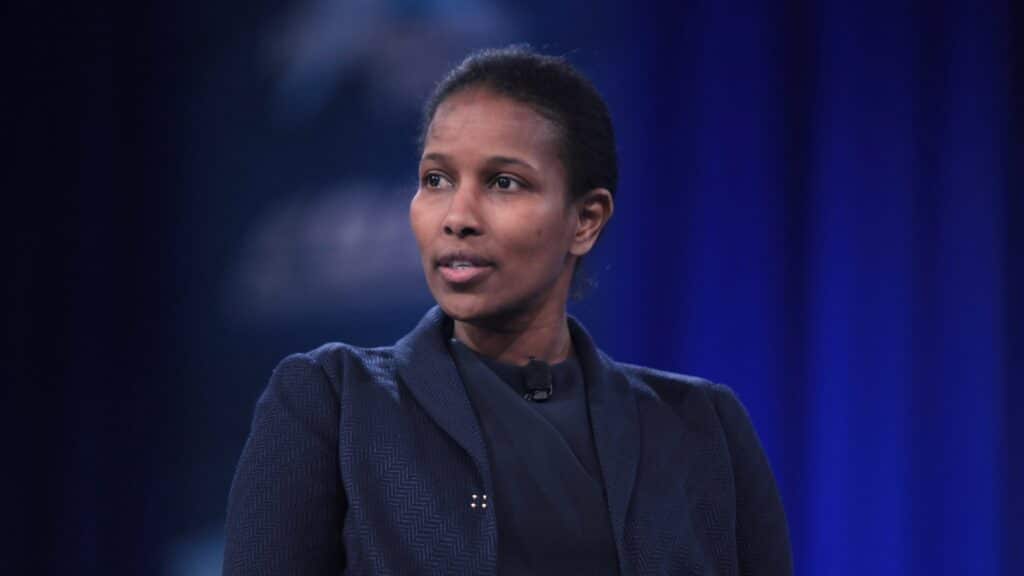


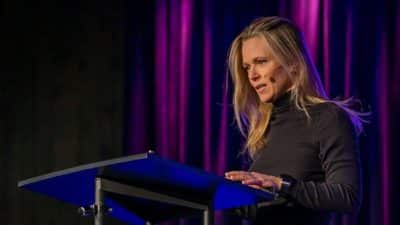

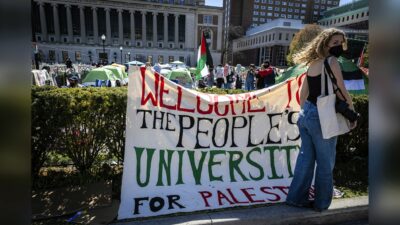

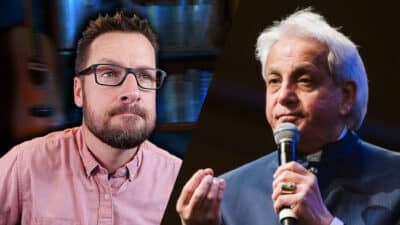
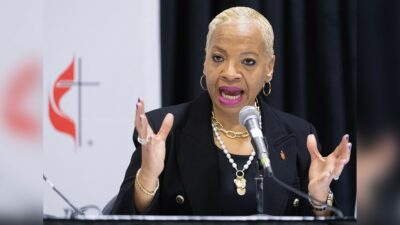







9 Responses
aww – and I was so hopeful – but then saw this:
“and the viral spread of woke ideology, which is eating into the moral fiber of the next generation.”
Hopefully she gets good teaching at whatever church she is attending because this is not the reason to convert and might make one wonder if it is true conversion at all or simply politics.
“The central problem of our age is not liberalism or modernism, nor the old Roman Catholicism or the new Roman Catholicism, nor the threat of communism, nor even the threat of rationalism and the monolithic consensus which surrounds us [nor, I would add today, postmodernism or materialistic consumerism or visceral sensualism or whatever]. All these are dangerous but not the primary threat. The real problem is this: the church of the Lord Jesus Christ, individually or corporately, tending to do the Lord’s work in the power of the flesh rather than of the Spirit. The central problem is always in the midst of the people of God, not in the circumstances surrounding them.” Francis Schaeffer
Respectfully, I think it may be different than what you perceive. I think I understand your concern (and Schaeffer’s) and respect it. I actually had a similar initial reaction.
Ali’s stated conversion doesn’t fit into the comfortable evangelical conversion narrative. But that doesn’t mean it is not something real. Consider the outlet she chose to publicly write of it on; it wasn’t Christianity Today by any means.
I do not know the quality or full nature of her conversion experience. I suspend evaluation even as I hope the best for her and even pray for her.
Jake Meador wrote well of this and I was helped by it. I recommend what he wrote.
“Ali’s conversion, then, shouldn’t be read as an instrumentalization of Christianity; it should be read as her finding divine love in the places where she has felt great pain and longing for something better. Indeed, when one zooms out a little to consider the broader landscape in the west one will likely find a great many people drawn to orthodoxy for reasons quite like those of Ali.”
It would be nice to hear the conversion experience from a prominent person; how she came to realize her sinfulness and her need of a Savior.
I also noticed there was no mention of Christ, His amazing love, mercy, forgiveness for us and no mention of her need for the Savior’s forgiveness. She speaks of needing to learn more of Christianity. No, learn more of Christ. Sorry, but I don’t believe this is a person who has truly been born again. It’s the appearance of changing her religion which is not the same as being a changed, new creature in Christ.
Let’s pray for this lady to fully understand and embrace the gospel of Jesus. She is a significant influencer whose conversion, if genuine, could impact the worldwide atheist community. It’s vital that she be discipled by mature believers and not used as a poster child for political causes.
I agree. The public eye isn’t exactly the best environment for a young believer. Still, a conversation between this lady and, say, Jemar Tisby would be fascinating to watch.
I don’t believe there is a “worldwide atheist community” as much as there is a worldwide community of skeptics who have never been shown convincing evidence for the existence of any gods, let alone Yahweh/ Jesus Christ. If Ms Hirsi Ali has suddenly found such demonstrable evidence for their existence, I imagine most atheists would be very open to that information.
There were many patriotic Chinese before 1900 that became Christians partly because they believed that Christianity would save China from its dismal state. They gave up whatever faith they had practiced, despite the way that supposedly Christian nations were abusing China. They weren’t thinking just of themselves.
If she has come to Christian faith, we should be encouraged by that and grateful to God that she is at this point. Just because she didn’t do it the way I (or you) did, doesn’t make it any less precious. Perhaps we could compare her with the Good Thief. How much did he know when he asked Jesus to remember him? Just enough.
Give her some time, for Pete’s sake.
Well said.
No one knows the quality of her conversion or personal faith. And no one yet knows how she will progress.
The concern which motivated her to identify as Christian is for the world around her, expressed on her own terms. The boxes that evangelicals like to see weren’t checked and that seems to be irking some. (but weren’t we all complaining a few minutes ago how we conceive of Christianity too individualistically?)